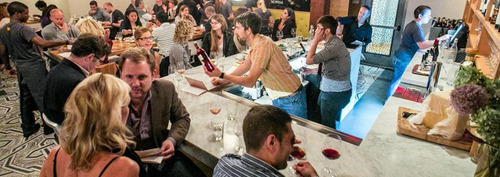Drop by the Central Bottle tasting table any Thursday, Friday, or Saturday (or any night at Belly Wine Bar, below) and you’re likely to see a crowd of regulars milling about and repeating a series of gestures that by now must seem perfectly routine — even second nature: pick up a glass holding a couple of ounces of wine, glance at it, flick your wrist to swirl it around in the glass, then sniff and sip. What happens next is not quite so predictable — matters of taste seldom are.
 People have all sorts of reactions to the what they taste, and all sorts of ways of talking about it. But despite the fact that reactions to what we taste can vary dramatically, and that some of us are manifestly more practiced at it than others, the physical means by which taste and smell are perceived are — barring injury or illness — the same for all. It’s just that we don’t quite understand how it all works. According to Yale professor of neurobiology Gordon M. Shepherd, we’re just beginning to appreciate both the apparatus and the processes that result is what he prefers to call flavor. In his 2012 book Neurogastronomy: How the brain creates flavor and why it matters, Professor Shepherd, who has spent his life in the laboratory studying the organs of smell, explains how taste and flavor are related — — but distinctly different.
People have all sorts of reactions to the what they taste, and all sorts of ways of talking about it. But despite the fact that reactions to what we taste can vary dramatically, and that some of us are manifestly more practiced at it than others, the physical means by which taste and smell are perceived are — barring injury or illness — the same for all. It’s just that we don’t quite understand how it all works. According to Yale professor of neurobiology Gordon M. Shepherd, we’re just beginning to appreciate both the apparatus and the processes that result is what he prefers to call flavor. In his 2012 book Neurogastronomy: How the brain creates flavor and why it matters, Professor Shepherd, who has spent his life in the laboratory studying the organs of smell, explains how taste and flavor are related — — but distinctly different.
A key point is that flavor is a combination of taste and smell and that smell involves more than just sniffing. As we take air IN from outside the body we draw in molecules that can be sensed by the nasal apparatus and we smell. As we chew food or slosh drink around in our mouths and swallow it we breathe OUT, forcing airborne molecules from inside over the same nasal apparatus. This is also smell, but of a qualitatively different kind.
The action of the tongue, teeth, cheeks, and jaw muscles liberate molecules that are sensed as air exits via the nose. This retronasal experience is generally the richer of the two. When you add the sensations generated by retronasal smell to those arising from taste (the tongue’s ability to perceive salt, sweet, sour, bitter, umami) you have the experience of flavor.
We all grew up being told that many animals have a more highly developed sense of smell than humans, but we now know that the organs of smell are only one part of how sensations are processed. The brain assembles these individual sensations into patterns that can be both remembered and manipulated. Humans have big brains and therefore more power for processing these sensations into patterns. It’s big brains that have made humans the gourmands of the animal world and given rise to the anthropology of of that rich and varied thing called cuisine. So, what might the new science of neurogastronomy have to tell us about wine tasting?
For one thing, it offers a plausible explanation for the wildly subjective aspects of the experience which often seem so puzzling. Why is one wine taster’s delightful, fresh-cut grass another’s too-pungent cattiness? It may have everything to do with the individual’s own bank of sense memories and the way a given brain organizes them — perhaps in a somewhat different way from my own. It also provides me with an explanation for why spitting wine has always seemed to rob me of something that’s present when I just send it down the hatch. My guess is that the missing element is contained in a final burst of retronasal sensation kicked off by the swallow reflex.
My new familiarity with retronasal olfaction did get me thinking about whether after we look, swirl, sniff, and sip we ought to be making a special effort to exhale in a kind of final, emphatic, nasal push – the better to extract every last bit of volatized molecular content from our Cotes-du-Rhone or Sierra Foothills chardonnay.
After a few fruitless experiments (and plenty of encouragement from my wife) I gave up the effort. It turns out that the whole swirl, sniff, sip ritual isn’t nearly so attractively urbane when punctuated by a snort.
Now for the question I’m really interested in: Why are some so people adept at connecting specific flavors with specific wines that they can win their game of 3 Blind Wines at Belly Wine Bar with regularity while I generally slink away defeated? You can be sure I plan to take that up with professor Shepherd when I meet him.
9/2/2013